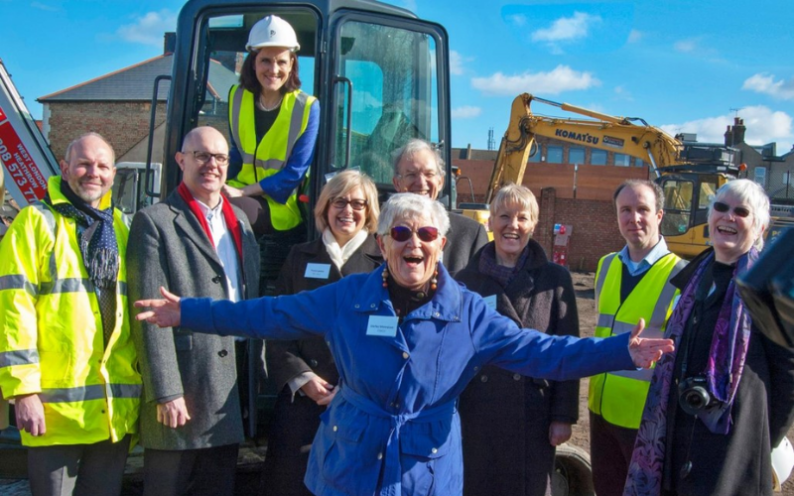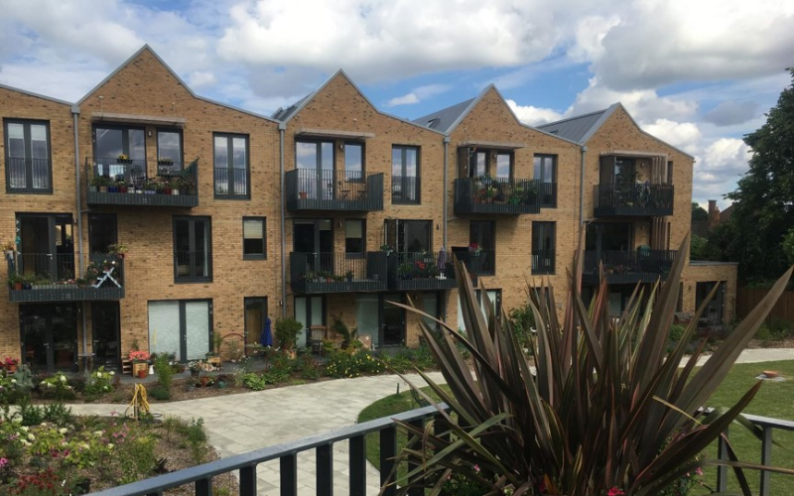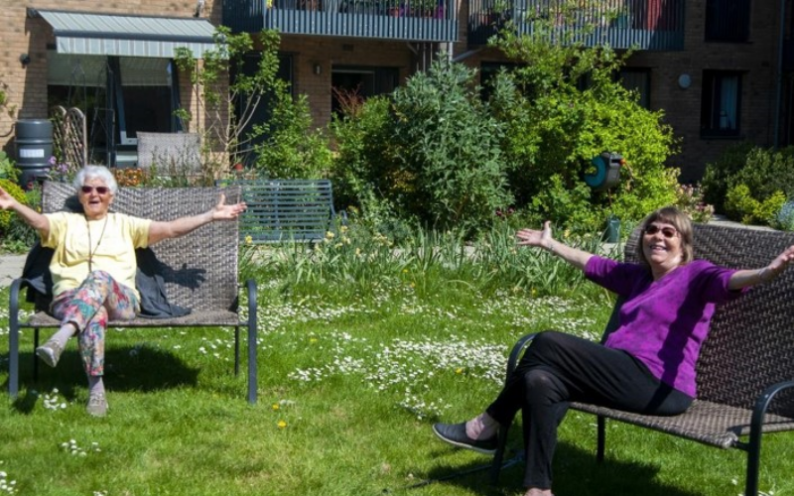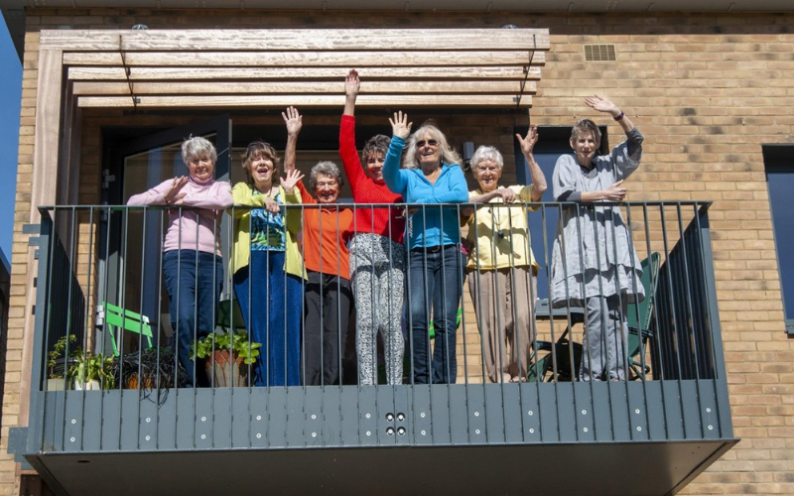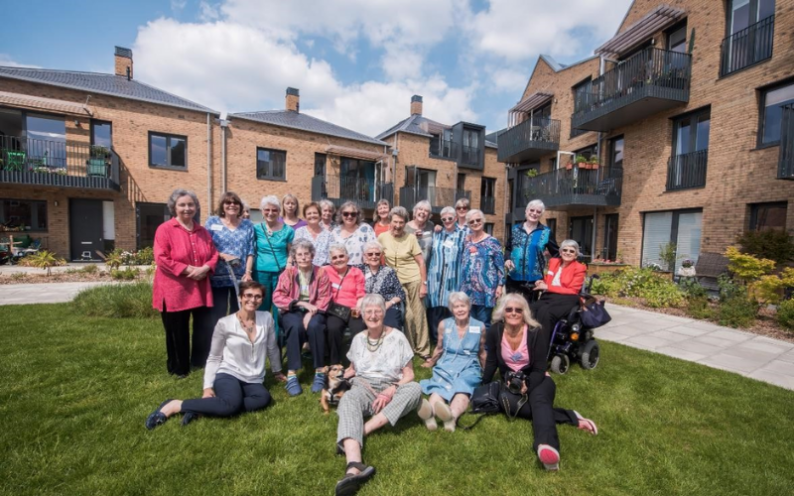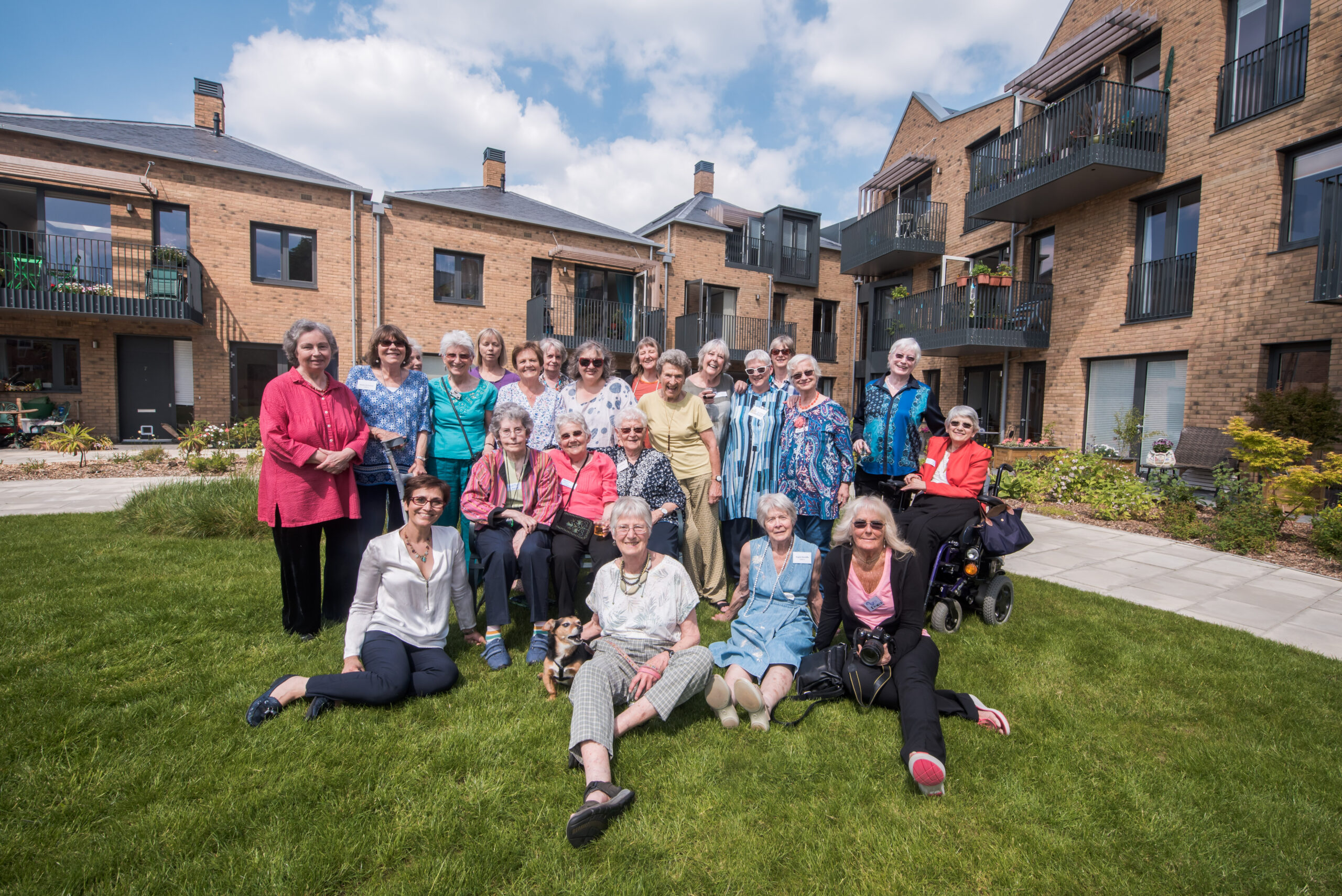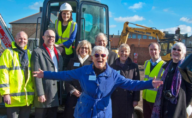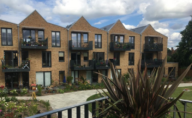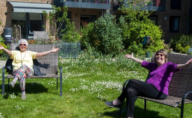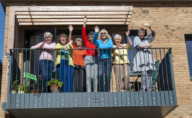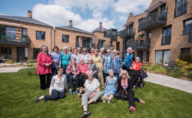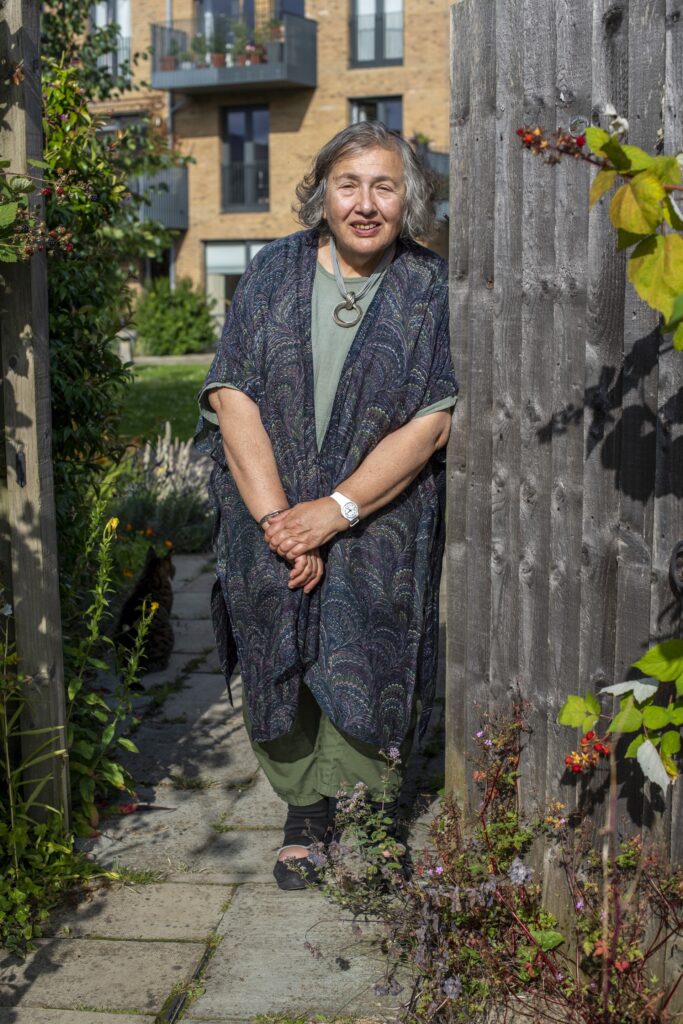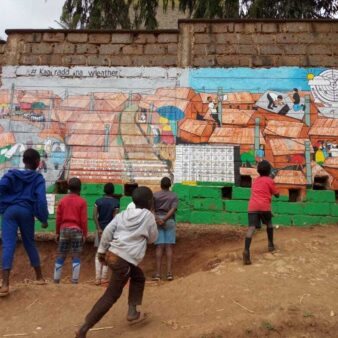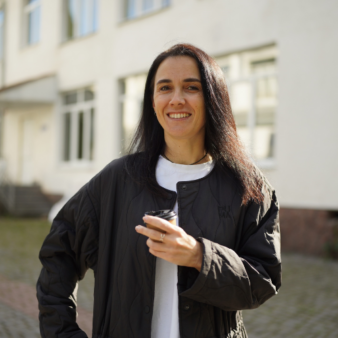More people are living longer than ever before and in the UK the number of people aged 85 and over is expected to double to 3.2 million by 2041. Older people often live alone and have health and mobility issues, which can make everyday tasks (like climbing stairs or taking a bath) more difficult. This can affect their ability to live independently and put increasing pressure on health and social care services. Despite this, new housing is not being built with older people in mind.
A group of women decided to tackle the shortage of housing suitable for older people head-on by creating their own ‘cohousing’ community in a new, purpose-built block of flats in North London. Cohousing groups are inclusive communities that are created and run by their residents. Each household has their own home in a building with communal spaces, where they can socialise and support each other.
New Ground Cohousing in High Barnet has 25 flats and is home to a diverse group of 26 women aged 58-94. It is the UK’s first and only cohousing community dedicated to women aged 50-plus. Unusually for a cohousing development, New Ground is mixed-tenure. This means that, while the majority of the flats are owner-occupied, some apartments are rented out as social housing.
The women hope New Ground will inspire more community-led housing developments and demonstrate to policymakers that this kind of group living can benefit society by combating isolation among older people and enabling them to stay independent for longer.
The project in practice
The idea for New Ground began in 1999, inspired by the success of cohousing communities in countries like Denmark and the Netherlands. Cohousing is not common in the UK and New Ground’s members spent years seeking finance and planning approval for the scheme. After setting up a limited company (Older Women’s Cohousing), New Ground’s members engaged in lengthy discussions with developers, banks, housing associations and local councils, educating them about the cohousing concept and getting the support they needed to bring the project to life. The project was eventually commissioned with the help of two housing associations: Hanover (which funded construction), and Housing for Women (which owns the freehold and acts as landlord for the social housing residents).
A major challenge was that housing lone older women is given lower priority than housing families. The group also found it difficult to get finance and had to compete with large developers to acquire land. Many potential sites were explored and fell through, but after winning the support of the local Director of Adult Social Care, they were eventually granted planning permission for the current site in High Barnet.
During this time, the group-built relationships with two housing associations: Hanover and Housing for Women. Hanover agreed to take on the role of developer and fund the construction of the building, before selling the flats to New Ground’s members. Housing for Women purchased the freehold to the land, providing security of ownership for residents. New Ground owns the head lease and each flat has a 250-year lease. The women were very involved throughout the six-year planning and construction period, choosing the architect and influencing the design of the building to suit their needs. Construction began in 2010 and the group moved into their homes in January 2017.
There are very few mixed-tenure cohousing communities in the UK. This is due to a misconception among some local authorities about how cohousing communities select their residents. New Ground successfully persuaded the council that they could meet the requirements for social housing and now provides eight apartments for social rent in the building.
Every woman living at New Ground is a registered member of the Older Women’s Cohousing company with an equal voice in decision-making. The women govern life together through a monthly meeting and work in teams to manage different aspects of the community. These include a management committee (elected annually), finance team, buildings team, garden team, green team, membership and transitions team, equality and diversity team, and a communications team.
New Ground’s members regularly advise other people interested in group living and actively promote cohousing by talking to policymakers and the media and holding workshops. The project has attracted a lot of interest and when it was featured by the BBC (British Broadcasting Company), the community received 400 requests from older women hoping to move in.
Women who would like to join the New Ground community can apply to become non-resident members. The only criteria is that they are over 50 years old and share New Ground’s core values. These include acceptance and respect for diversity, care and support for each other, countering ageist stereotypes, co-operating and sharing responsibility, maintaining a structure without hierarchy, and caring for the environment. If a flat becomes available, non-resident members can apply for it, with leasehold flats sold to the next person at market value.
Social impact
The inclusion of social housing in the scheme enables older women from less privileged backgrounds to live in a high-quality affordable home. It also increases the diversity of the community, which includes a mix of sexualities, abilities, heritages, and cultures.
Living in a warm home, designed around the needs of older people, gives New Ground’s residents a better quality of life. Older people who live alone can become isolated from their communities, especially if they have mobility problems. The supportive, self-governing nature of co-living keeps residents connected, physically and mentally active, and in charge of their own lives.
The women gained a huge amount of experience on their 18-year journey to build New Ground. Members have become keen co-living advocates and regularly share their knowledge within the UK Cohousing Network. This has helped to raise the profile of cohousing in the UK and challenges ageist views of older people’s capabilities.
New Ground has also inspired a growing number of community-led housing developments. In 2016, the All-Party Parliamentary Group on Housing and Care for Older People recommended that more housing associations support the UK’s senior cohousing movement. The project also influenced the creation of the London Community Housing Fund, which finances new community-led housing schemes.
Environmental impact
Environmental sustainability is one of New Ground’s core values. The community has a Climate Resilience Strategy that includes nurturing green spaces to grow fruit and vegetables, composting, rainwater collection and solar panels to generate renewable energy. The homes are double glazed, have efficient underfloor heating systems and were built with insulation that exceeds regulatory requirements to maximise comfort and warmth for residents.
In the future, the community hopes to become even greener, by replacing the gas central heating system with either air-source or ground-source heat pumps, increasing the number of solar panels, and building a reservoir beneath the garden to store more rainwater.
Funding
The total cost of the project was £7,700,000 GBP ($9,524,515 USD).
New Ground received funding totalling £1,270,000 ($1,568,008 USD) from The Tudor Trust and a grant of around £15,000 GBP ($18,557 USD) from The Joseph Rowntree Foundation. Hanover Housing Association funded the development and construction, selling the flats to residents once the building was finished for a pre-agreed price. This ranged from £380,000 GBP ($470,431 USD) to £480,000 GBP ($594,229 USD), depending on the size of the apartment. Current leasehold residents paid for their flats through the sale of their previous homes.
The housing association flats are let at social rent rates. In London this averages about £116.16 GBP ($141.85 USD) per week. Running costs for 2022 were £44,000 GBP ($54,425 USD), including heating, cleaning and maintenance. These costs are covered by service charges and income generated from New Ground’s internal charges for parking, laundry, and guest rooms etc.
Transfer and expansion
New Ground hopes to inspire other cohousing initiatives and make senior co-living a viable alternative to traditional housing. Whether this happens, depends on local regulations, but New Ground has set an important precedent in the UK and is committed to promoting the benefits of cohousing.
The community works closely with the UK Cohousing Network, publishing reports on New Ground’s structure and the basic principles for building a co-living community. Members introduce housing professionals and potential cohousing residents to the process, explaining how it works and demonstrating its success.
As the UK’s population ages, the need for housing suitable for older people will become more urgent. New Ground Cohousing is a positive example of a housing model that does not marginalise, de-skill or de-value older people. If actively encouraged and scaled, these kinds of communities could significantly improve older people’s quality of life, while decreasing pressure on national health and social care services.
Download your free copy of the full project summary

